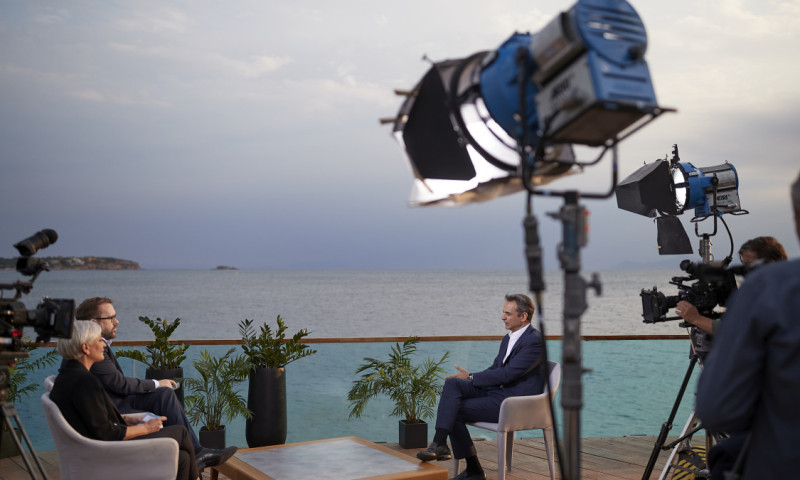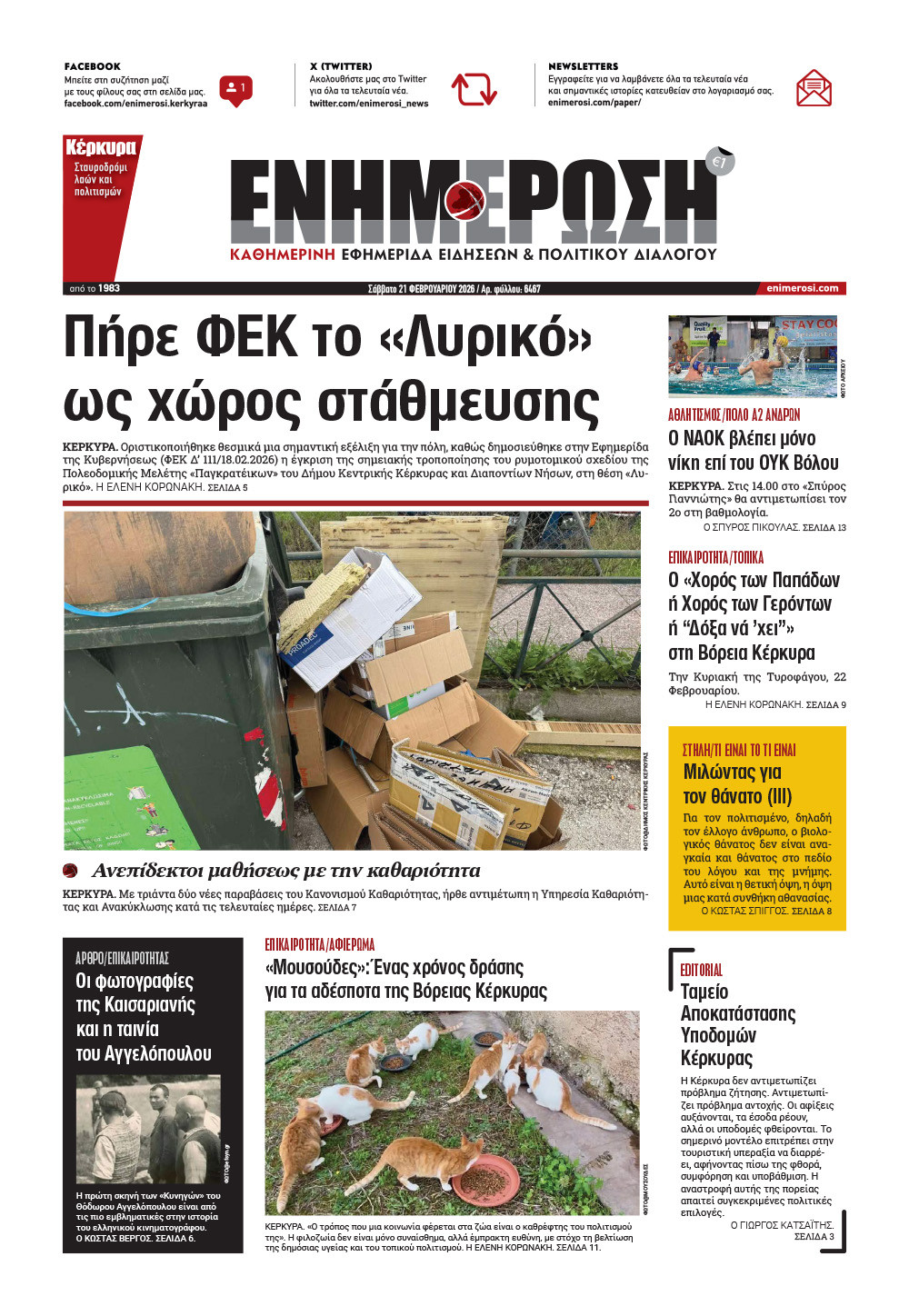Greek PM: We will allow flights to the islands for German tourists from 1 July
 Photo: INTIME
Photo: INTIME
Mitsotakis
27 May 2020
/ 12:27
ATHENS. In an interview with Bild Kyriakos Mitsotakis said that "German tourists are welcome to the Greek islands with direct flights as of July 1 and to Athens as of June 15."
Prime Minister Kyriakos Mitsotakis spoke of the way in which Greece was able to contain the coronavirus pandemic in an interview with the German newspaper Bild. He also explained the Government's plan to safely reopen the country to visitors from abroad. A large part of the interview also focussed on the Government's measures to support employment and the Merkel-Macron plan and the reactions head of the Summit Meeting.
In his conversation with journalists Liana Spyropoulou and Paul Ronzheimer Kyriakos Mitsotakis stressed that after a long period of time Greece is now recognised for its high level of reliability - "We are a positive example and that gives people a sense of certainty and trust in the ability of the state to respond effectively," he said.
"We intend to open tourist activities to the countries that have similar epidemiological data to those of Greece," such as Germany, with its low pandemic dispersal rates. German tourists, he added, are welcome to Athens as of June 15 and to the islands as of July 1
Mitsotakis said that there won't be mandatory tests of all arrivals but visitors and tourists will face spot checking to prevent the spreading of the virus. They will have access to basic instructions and the location of the nearest health facility via an electronic application (mobile app).
"Visitors will have access to basic instructions and the location of the nearest health facility via an electronic application (mobile app). We will also make sure that sufficient diagnostic tests are found at all the islands, even small islands, if someone needs to be tested while it will also be possible for a visitor to be transported to an Athens hospital, if needed. So we are monitoring the situation carefully to ensure that health services are organised a way that will make visitors and tourists feel safe when in Greece," he said.
"We will implement basic social distancing regulations based on our experience in Greece. Simple measures such as keeping distances, personnel in tavernas and hotels wearing protective masks. Here everyone is wearing masks. We want everyone to have a wonderful experience. We don't know yet what will happen with the night clubs, there will possibly be some limits here, but the basic experience will be the same, with some extra precautions: going to the beach and eating out at a nice taverna or restaurant. The beaches reopened about ten days ago and there has been order, distances between umbrellas and sunbeds have been maintained and everything has been done in a very organised way. So we are hoping that it will be the same when we open up for tourism," said Kyriakos Mitsotakis.
"In essence, life in Greece in the summer is outdoors and so we want to limit indoor activities as much as possible. However, this will be easy - as you can understand, nobody wants to come to Greece and stay indoors in the summer; they want to come to Greece because they can be outside all the time," he added. "Apart from sleep, people can be outdoors all the remaining time."
Solidarity among EU member states is key to recovering from the economic implications of the coronavirus pandemic, he noted, and added that the proposal by French President Emmanuel Macron and German Chancellor Angela Merkel for the creation of a European Recovery Fund "lays the groundwork for something important, and I am confident that an agreement will be reached at the next Summit."
On Turkish promotion of refugees and migrants to Greece through the borders at Evros, Mitsotakis said that "we have made it crystal clear that Greece will protect its national border, which happens to be Europe's border too. Speaking of EU solidarity to Greece on the border incidents recently, the premier said nevertheless that "we have to cooperate with Turkey on the migration crisis, as it currently hosts 4 million refugees and does indeed deserve European aid for that, a point I have put across to President Erdogan from the very start."
But, he observed, "this is something that cannot be achieved by means of political blackmail," and what is needed is sincere talk on how Europe may help Turkey, Mitsotakis concluded.
Source: skai.gr
In his conversation with journalists Liana Spyropoulou and Paul Ronzheimer Kyriakos Mitsotakis stressed that after a long period of time Greece is now recognised for its high level of reliability - "We are a positive example and that gives people a sense of certainty and trust in the ability of the state to respond effectively," he said.
"We intend to open tourist activities to the countries that have similar epidemiological data to those of Greece," such as Germany, with its low pandemic dispersal rates. German tourists, he added, are welcome to Athens as of June 15 and to the islands as of July 1
Mitsotakis said that there won't be mandatory tests of all arrivals but visitors and tourists will face spot checking to prevent the spreading of the virus. They will have access to basic instructions and the location of the nearest health facility via an electronic application (mobile app).
"Visitors will have access to basic instructions and the location of the nearest health facility via an electronic application (mobile app). We will also make sure that sufficient diagnostic tests are found at all the islands, even small islands, if someone needs to be tested while it will also be possible for a visitor to be transported to an Athens hospital, if needed. So we are monitoring the situation carefully to ensure that health services are organised a way that will make visitors and tourists feel safe when in Greece," he said.
"We will implement basic social distancing regulations based on our experience in Greece. Simple measures such as keeping distances, personnel in tavernas and hotels wearing protective masks. Here everyone is wearing masks. We want everyone to have a wonderful experience. We don't know yet what will happen with the night clubs, there will possibly be some limits here, but the basic experience will be the same, with some extra precautions: going to the beach and eating out at a nice taverna or restaurant. The beaches reopened about ten days ago and there has been order, distances between umbrellas and sunbeds have been maintained and everything has been done in a very organised way. So we are hoping that it will be the same when we open up for tourism," said Kyriakos Mitsotakis.
"In essence, life in Greece in the summer is outdoors and so we want to limit indoor activities as much as possible. However, this will be easy - as you can understand, nobody wants to come to Greece and stay indoors in the summer; they want to come to Greece because they can be outside all the time," he added. "Apart from sleep, people can be outdoors all the remaining time."
Solidarity among EU member states is key to recovering from the economic implications of the coronavirus pandemic, he noted, and added that the proposal by French President Emmanuel Macron and German Chancellor Angela Merkel for the creation of a European Recovery Fund "lays the groundwork for something important, and I am confident that an agreement will be reached at the next Summit."
On Turkish promotion of refugees and migrants to Greece through the borders at Evros, Mitsotakis said that "we have made it crystal clear that Greece will protect its national border, which happens to be Europe's border too. Speaking of EU solidarity to Greece on the border incidents recently, the premier said nevertheless that "we have to cooperate with Turkey on the migration crisis, as it currently hosts 4 million refugees and does indeed deserve European aid for that, a point I have put across to President Erdogan from the very start."
But, he observed, "this is something that cannot be achieved by means of political blackmail," and what is needed is sincere talk on how Europe may help Turkey, Mitsotakis concluded.
Source: skai.gr












